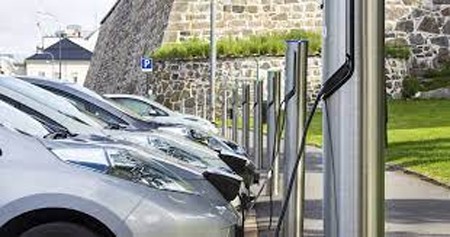Plan to deliver electric vehicle charging infrastructure in the borough approved by Cabinet | A plan outlining how the Royal Borough will bring forward hundreds more charging points for electric vehicles, helping to support the move to greener travel, has been approved by Cabinet.
The Electric Vehicle Chargepoint Implementation Plan received overwhelming support during a five-week public consultation, with almost 80% of respondents agreeing or strongly agreeing that, if implemented, the plan would give them the confidence that an electric vehicle would meet their daily needs.
It sets out how the council will ensure charging provision for electric vehicles keeps pace with demand and contains a number of policies on the delivery and operation of chargepoints in the borough, as well as general principles on where they should be located. The 10-year plan is due to begin in the next financial year where work will start to identify preferred commercial partners to carry out the on-street and car park chargepoint rollout programmes.
The sale of new petrol and diesel cars and vans in the UK will end in 2030 and with the target of achieving net zero carbon emissions by 2050 at the latest in the council’s Environment and Climate Strategy there is a need to ensure infrastructure is in place enabling residents to make the switch to electric.
To meet the demand, it is anticipated there will need to be around 600 on-street chargepoints at up to 300 ‘Connected Corner’ sites - where on-street charging will usually be located near street corners, serving multiple streets. In addition, the plan outlines the need for more than 120 chargepoints in council car parks, along with almost 100 rapid recharge points at service stations in the borough.
The plan has looked to incorporate consumer needs and preferences regarding the positioning and design of chargepoints and the facilities that they offer. This includes ensuring chargepoints are short walks from the homes they serve, availability of contactless payment, live data on chargepoint availability, and simple, transparent per unit pricing that is prominently displayed.
Like most councils, the Royal Borough will partner with commercial operators, who will install, operate and maintain chargepoints over an agreed period. Suppliers will be expected, through the procurement process, to identify how they will fund their bid. It is expected that the plan could be delivered utilising private finance from chargepoint suppliers, combined with Government grant funding.
Councillor Phil Haseler, Cabinet Member for Planning, Parking, Highways & Transport, said: “In our borough, 33% of carbon emissions come from the vehicles on our roads. The council is committed to working with partners and the community to tackle climate change and switching the way we power our cars and vans is a critical component of this.
“Many residents and businesses have already embraced electric vehicles, and we know that many more will be keen to do so over the coming years. We recognise that for everyone to make the switch, the right charging infrastructure will need to be available around the borough. We want to give as many people as possible the confidence to switch to an electric vehicle at the earliest opportunity, to decarbonise borough emissions as rapidly as we can. Providing chargepoints serves to accelerate the transition by demonstrating that driving electric is set to become a normal part of everyday life, as well as offering reassurance to non-users that they will be able to find chargepoints when they need them if they switch to electric.
“This plan, which we committed to deliver in our Corporate Plan, sets out how the council will play its role in ensuring infrastructure is put in place, in readiness for the upcoming national bans on sales of new petrol and diesel vehicles. It seeks to balance meeting the demand for chargepoints in built-up areas with avoiding ‘not spots’ of inadequate chargepoint provision in the borough’s villages and more rural areas. We want to ensure this infrastructure meets the needs that people have across our borough, so thank you to everyone who took part in the consultation and gave us their feedback which has helped us make revisions to the document.”
Cabinet agreed last night (Thursday) to approve the plan and the decision is subject to the standard call-in period.












